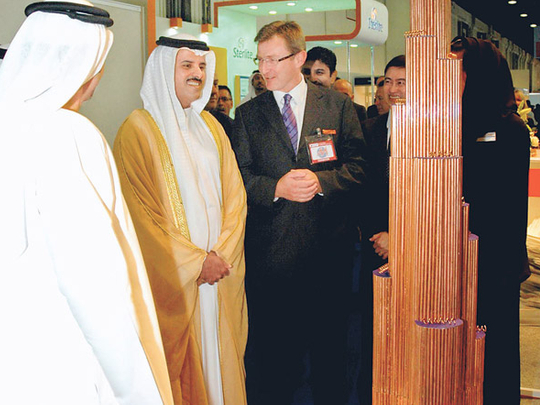
Dubai: Authorities in the UAE are investing billions of dollars to more than double electricity output and fuel the country's economic growth.
Since the UAE released estimates that annual peak demand for electricity is expected to rise to more than 40,000 megawatts by the end of 2020, the government has taken steps to develop additional sources of electricity and meet future demand. Authorities have said that massive public spending will require additional power.
"There's always growth here in terms of infrastructure and in terms of the number of projects that have been announced," Anita Mathews, exhibition director of the Middle East Electricity (MEE) exhibition that kicked off at the Dubai World Trade Centre, told Gulf News.
"That's why the international players come to set up their own manufacturing plants to supply to this region or to export."
The projected jump from a current demand of over 16,000 megawatts to 40,000 megawatts was released in a study conducted by official UAE entities. It reflects a cumulative annual growth rate of around nine per cent from 2007 onward.
Alternative sources
The power plants in the UAE are fuelled by oil and gas. However, authorities are currently looking at clean and renewable energy sources that will ensure sustainable development.
In December 2009, the Emirates Nuclear Energy Corporation (ENEC) signed a $20 billion (Dh73.4 billion) contract with a South Korean company, the Korea Electric Power Corporation (KEPCO), to design, build and help operate four 1,400-megawatt nuclear power plants for the UAE's peaceful nuclear energy programme.
According to the white paper on the nation's nuclear programme called ‘Policy of the United Arab Emirates on the Evaluation and Potential Development of Peaceful Nuclear Energy', the amount of natural gas that could be made available to the nation's electricity sector would be insufficient to meet future demands, providing adequate fuel for only 20,000-25,000 megawatts of generating capacity by 2020.
In Dubai, the Dubai Electricity and Water Authority (Dewa) expects the emirate's capacity to rise from 7,000 to 10,000 megawatts this year.
Dewa has also announced its plans to commission the first private sector power plant.
While the commissioning has been delayed for over a year, Dewa officials have said that the act comes in response to the slow growth in Dubai's demand for power.
The privatisation of the Hassyan power plant would only provide 1,500 megawatts of electricity.
Although initiatives have been taken to develop alternative energies including solar and wind, their aggressive development can only supply six or seven per cent of peak electricity demand by 2020, the paper stated.
In addition to Dewa, the Federal Electricity and Water Authority has already planned public-private partnerships to accelerate power projects, while Abu Dhabi has already privatised the power sector, to a certain extent.
Dubai What has been touted as the biggest electricity exhibition in the Middle East opened its doors yesterday at the Dubai International Exhibition Centre in Dubai.
The exhibition, which has been running for the past 35 years, has 1,000 exhibitors from 18 different countries participating at this year's event.
Organisers are expecting the exhibition to draw more than 43,000 visitors — more visitors than last year.
Exhibition director Anita Mathews said that the main focus of the event was to bring the new technology from the international market to the region.
"You have to get your technology right," she said, referring to players with long-term visions for their businesses.
After Abu Dhabi's recent contract to build reactors and develop nuclear energy, the region has become more attractive to many international players, Mathews explained.
Networking
Ducab, one of the largest cable manufacturers in the UAE and the first to have a copper rod plant in the country, was present at the exhibition. The company sees the event as a great networking and marketing opportunity.
"People who come here from around the region are looking for good quality suppliers and we get the opportunity to interact with them," said Chew Wah Tan, general manager of sales and marketing at Ducab.












